Chinese New Year 2025
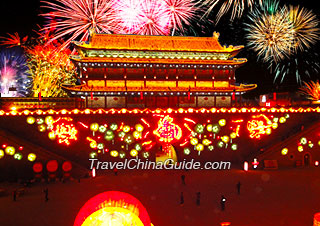
| Chinese: | 春节 chūn jié |
|---|---|
| Also called: | Lunar New Year, Spring Festival |
| Observed by: | All Chinese people; people in some other Asian countries like Malaysia, Singapore, Philippines… |
| 2025 date: | Wednesday, Jan. 29th, Snake |
| 2026 date: | Tuesday, Feb. 17th, Horse |
| Holiday: | 8 days |
China's Grandest Festival & Longest Public Holiday
2025 Chinese New Year date: Jan. 29th, Wednesday, Year of the Snake
Chinese New Year, also known as Spring Festival or Lunar New Year, is the grandest festival in China, usually with a 8 days' holiday. As the most colorful annual event, the traditional CNY celebration lasts longer, up to two weeks, and the climax arrives around the Lunar New Year's Eve.
China during this period is dominated by iconic red lanterns, loud fireworks, massive banquets and parades, and the festival even triggers exuberant celebrations across the globe.
2025 – The Year of the Snake
Time for Family Reunion
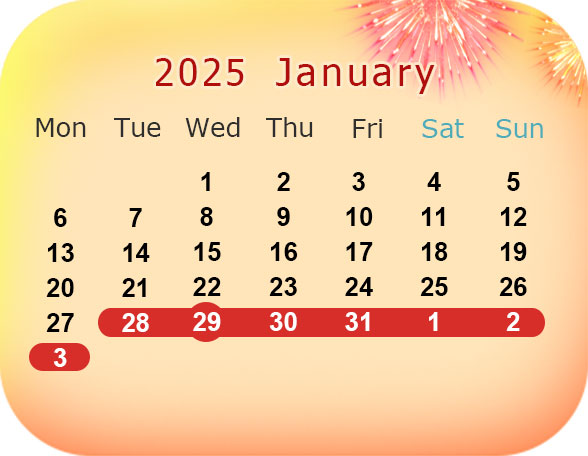
When is Chinese New Year?
| Year | Date | Day | Holiday |
|---|---|---|---|
| 2025 | Jan. 29 | Wednesday | Jan. 28 - Feb. 4 |
| 2026 | Feb.17 | Tuesday | Feb.16 - Feb. 23 |
| 2027 | Feb.6 | Saturday | Feb.5 - Feb.12 |
| 2028 | Jan. 26 | Wednesday | Jan. 25 - Feb. 1 |
| 2029 | Feb. 13 | Tuesday | Feb. 12 - 19 |
Why is it called Spring Festival?
How do Chinese people celebrate the festival? – Customs & Activities
House Cleaning and Decorating – half month before
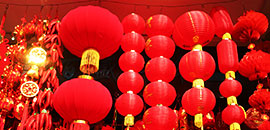 No matter whether in a city apartment or a countryside villa, there must be a diligent housewife exerting all her energies to carry out a thorough clean of the house before Chinese New Year. Sweeping, mopping, wiping, washing… Sometimes the whole family needs to give a hand with the chores, to make sure the house is rid of the old year's dust and is prepared for taking in the fortune of the New Year. Then every house is decorated with the most favored color, the bright Red – red lanterns, Chinese knots, Spring Festival couplets, 'Fu' character pictures, and red window paper-cuts. Read more about How to Decorate for Chinese New Year.
No matter whether in a city apartment or a countryside villa, there must be a diligent housewife exerting all her energies to carry out a thorough clean of the house before Chinese New Year. Sweeping, mopping, wiping, washing… Sometimes the whole family needs to give a hand with the chores, to make sure the house is rid of the old year's dust and is prepared for taking in the fortune of the New Year. Then every house is decorated with the most favored color, the bright Red – red lanterns, Chinese knots, Spring Festival couplets, 'Fu' character pictures, and red window paper-cuts. Read more about How to Decorate for Chinese New Year.Family Reunion Dinner – New Year's Eve
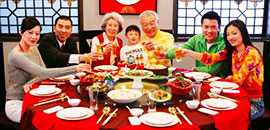 Home is the principal focus of the Spring Festival. All Chinese people manage to make their way home at the latest by New Year's Eve, for a reunion dinner with the whole family. The essential course on all Chinese menus for a reunion dinner will be a steamed or braised whole fish, representing a surplus every year. Various kinds of meat, vegetable, and seafood are made into dishes with auspicious meanings. Dumplings are indispensable for northerners, while rice cakes for southerners. The night is spent enjoying this feast along with cheerful family talk and laughter. Read more Chinese New Year Foods.
Home is the principal focus of the Spring Festival. All Chinese people manage to make their way home at the latest by New Year's Eve, for a reunion dinner with the whole family. The essential course on all Chinese menus for a reunion dinner will be a steamed or braised whole fish, representing a surplus every year. Various kinds of meat, vegetable, and seafood are made into dishes with auspicious meanings. Dumplings are indispensable for northerners, while rice cakes for southerners. The night is spent enjoying this feast along with cheerful family talk and laughter. Read more Chinese New Year Foods.Giving Red Envelopes – Best Wishes through Money
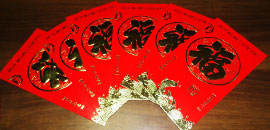 From newborn babies to teenagers, luck money will be given by seniors, wrapped in red packets in the hope of dispelling evil spirits from the kids. CNY 100 to 500 notes are commonly sealed in a red envelope, while there are big ones with up to CNY 5,000 especially in the rich southeast regions. Besides a small disposable amount, most of the money is used to buy the kids toys, snacks, clothes, stationery, or saved for their future educational expenditure. Read more about Red Envelope.
From newborn babies to teenagers, luck money will be given by seniors, wrapped in red packets in the hope of dispelling evil spirits from the kids. CNY 100 to 500 notes are commonly sealed in a red envelope, while there are big ones with up to CNY 5,000 especially in the rich southeast regions. Besides a small disposable amount, most of the money is used to buy the kids toys, snacks, clothes, stationery, or saved for their future educational expenditure. Read more about Red Envelope.Send Greetings and Red Envelopes through Wechat
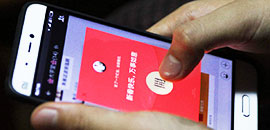 With the popularity of instant messaging apps, greeting cards are seldom seen. From the morning to the midnight of the New Year's Eve, people use the app Wechat to send various text messages, voice messages, and emojis, some of which featuring the New Year's animal sign, to exchange greetings and good wishes. Digital red envelopes are becoming considerably popular and a big red envelope in a group chat always starts a happy grabbing game.
With the popularity of instant messaging apps, greeting cards are seldom seen. From the morning to the midnight of the New Year's Eve, people use the app Wechat to send various text messages, voice messages, and emojis, some of which featuring the New Year's animal sign, to exchange greetings and good wishes. Digital red envelopes are becoming considerably popular and a big red envelope in a group chat always starts a happy grabbing game.Watching CCTV New Year's Gala – 20:00 to 00:30
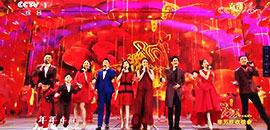 It is undeniable that the CCTV New Year's Gala is China's most watched television special, despite the declining viewership in recent years. The 4.5-hour live broadcast features music, dance, comedy, opera, and acrobatic performances. Although the audience becomes more and more critical of the programs, that never stops people turning on the TV on time. The delightful songs and words act as a habitual background to a reunion dinner, for after all it's been a tradition ever since 1983.
It is undeniable that the CCTV New Year's Gala is China's most watched television special, despite the declining viewership in recent years. The 4.5-hour live broadcast features music, dance, comedy, opera, and acrobatic performances. Although the audience becomes more and more critical of the programs, that never stops people turning on the TV on time. The delightful songs and words act as a habitual background to a reunion dinner, for after all it's been a tradition ever since 1983.Setting off Firecrackers at 00:00
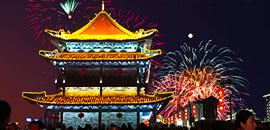 There is New Year bell on the TV gala at 0:00, but you can hardly hear it since there would be loud bangs of firecrackers, from 0:00 to 0:30 and even later. Chinese people have by long tradition set off firecrackers, originally to scare away the legendary monster Nian which emerges at midnight. In recent years, many urban areas have a firecracker ban or set special area or period for fireworks, to prevent accidents and threats to air quality.
There is New Year bell on the TV gala at 0:00, but you can hardly hear it since there would be loud bangs of firecrackers, from 0:00 to 0:30 and even later. Chinese people have by long tradition set off firecrackers, originally to scare away the legendary monster Nian which emerges at midnight. In recent years, many urban areas have a firecracker ban or set special area or period for fireworks, to prevent accidents and threats to air quality.Half-month Visiting Relatives – from One Family to Another
 After a day at home, people start to visit relatives from the second day of the New Year. The married couples go to visit the wife's parents' home on the second day. The following days will be spent in various relatives' houses. For some extended families in rural areas, half a month is barely enough to visit everyone. People bring gifts to one another's homes and give red envelopes to the kids. That's a ritual. Get inspired by more Chinese New Year Gift Ideas.
After a day at home, people start to visit relatives from the second day of the New Year. The married couples go to visit the wife's parents' home on the second day. The following days will be spent in various relatives' houses. For some extended families in rural areas, half a month is barely enough to visit everyone. People bring gifts to one another's homes and give red envelopes to the kids. That's a ritual. Get inspired by more Chinese New Year Gift Ideas.Folk Shows and Temple Fairs – Lasting to 15th day of 1st lunar month
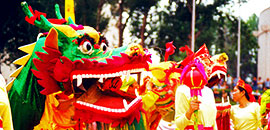 In urban areas, there are bustling temple fairs with religious worship, costume performances, games, and local snacks. Some locations have lantern fairs, offering great night fun. In rural areas, more authentic folk shows are likely to be seen, including the yangko dance and stilt walking in north China and dragon and lion dances prevailing in southern regions. See Best Temple Fairs in Beijing.
In urban areas, there are bustling temple fairs with religious worship, costume performances, games, and local snacks. Some locations have lantern fairs, offering great night fun. In rural areas, more authentic folk shows are likely to be seen, including the yangko dance and stilt walking in north China and dragon and lion dances prevailing in southern regions. See Best Temple Fairs in Beijing.What to Eat – Priority of the Festival
New Year Menu from a Chinese Family
-
Dumplings
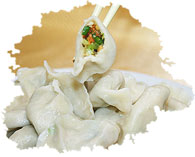 – salty
– salty
– boil or steam
– symbol of fortune for its shape like an ancient Chinese gold ingot. -
Fish
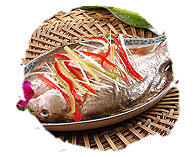 – salty
– salty
– steam or braise
– symbol of a surplus in the year end and good luck for the coming year. -
Glutinous Rice Balls
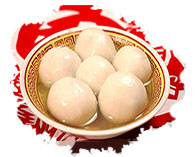 – sweet
– sweet
– boil
– round shape standing for completeness and family reunion. -
Spring Rolls
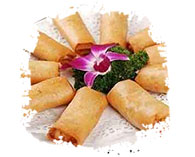 – both sweet and salty
– both sweet and salty
– fry
– appearance like a gold bar and stuff with fresh veg meaning a fresh start.
Travel during Chinese New Year – 5 Things You should Know
The 40 days around the festival is a huge peak travel period, when all migrant workers and students are on their way home, contributing to an amazing volume of 3 billion passengers! Remember: Avoid the Spring Festival Travel Rush; if unavoidable, keep away from train travel; if you can't, buy tickets as EARLY as possible.
2. Calm down when hearing the firecrackers:
Spectacular pyrotechnics displays will light up the sky and loud bangs traverse the whole country. Don't panic. It has nothing to do with terrorists, but just celebration.
3. Shortened opening hours:
Public transport, banks, and other public service sectors have shorter opening hours during the holiday. Business comes almost to a stop. Many restaurants and shops close for the holiday.
4. Where to go:
Beijing, Xi'an, and Pingyao feature traditional celebrations of north China, Guangzhou retains south China folk customs, while Harbin is a popular January destination for the exciting ice and snow activities. See 5 Best Places to Go for Chinese New Year 2025.
5. Weather & Clothing:
– Southern areas like Guangdong, Hong Kong, Taiwan, Yunnan: 5 ~ 15°C; sweater + jacket or trench coat
– South and east areas including Shanghai & Hangzhou: 2 ~ 10°C; sweater + light down jacket
– Central China including Xi’an & Chengdu: -3 ~ 8 °C; sweater + thick down jacket
– North destinations around Beijing: -10 ~ 5°C; wool sweater + thick parka or down coat
– Northeast cities like Harbin: -30 ~ -10°C; as thick as possible
How to Say Happy New Year in Chinese
- 新年好xīn nián hǎo
- 过年好guò nián hǎo
- 新年快乐xīn nián kuài lè




